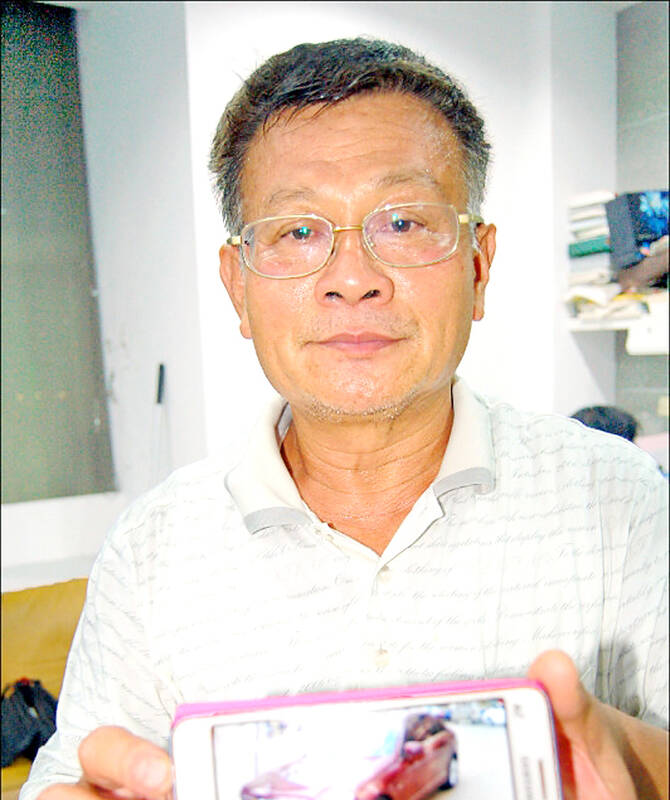The Taipei District Prosecutors’ Office yesterday indicted Taiwan People’s Communist Party Chairman Lin Te-wang (林德旺), along with party members Cheng Chien-hsin (鄭建炘) and Yu Sheng-hung (余聲洪), over alleged contraventions of the Anti-infiltration Act (反滲透法) and asked the court to consider heavy penalties.
Lin, who had been a Central Committee member of the Chinese Nationalist Party (KMT), has traveled to China as a representative of Taiwanese businesspeople in China since 2007, investigators said.
After the KMT stripped him of his membership, Lin in 2016 made a failed bid for the legislative seat representing Tainan’s first electoral district, prosecutors said, adding that he founded the Taiwan People’s Communist Party in 2017 and has been its chairman since then.

Photo: Taipei Times
Lin forged close ties with Hu Chunguang (胡春光), an official of the Political Party Bureau of China’s Taiwan Affairs Office, for over a decade, prosecutors said.
In a bid to elicit support from the Chinese Communist Party (CCP) for his businesses in China, Lin hosted multiple visits by CCP officials and was directed by Hu to involve himself in Taiwan’s elections to advance China’s “united front” efforts, the indictment said.
Lin allegedly instructed Cheng to run for Taipei city councilor last year and later worked with Yu to illegally import Chinese-made COVID-19 rapid test kits in a bid to bolster his party’s election prospects, it said.
Lin also used Chinese national flags given to him by the Vexillological Research Center China at protests against a visit to Taipei in August last year by then-US House of Representatives speaker Nancy Pelosi in hopes of being made an agent to sell Chinese-made Maotai liquor, and becoming the go-to person to arrange tours by CCP personnel to Taiwan, the indictment said.
Lin was also charged with planning to give NT$500 and the Chinese rapid antigen test kits to protesters mobilized by his party at rallies against Pelosi.
Prosecutors said they sought severe penalties, as Lin and Chen had not cooperated with the probe.
The trio have denied the charges.

‘FORM OF PROTEST’: The German Institute Taipei said it was ‘shocked’ to see Nazi symbolism used in connection with political aims as it condemned the incident Sung Chien-liang (宋建樑), who led efforts to recall Democratic Progressive Party (DPP) Legislator Lee Kun-cheng (李坤城), was released on bail of NT$80,000 yesterday amid an outcry over a Nazi armband he wore to questioning the night before. Sung arrived at the New Taipei City District Prosecutors’ Office for questioning in a recall petition forgery case on Tuesday night wearing a red armband bearing a swastika, carrying a copy of Adolf Hitler’s Mein Kampf and giving a Nazi salute. Sung left the building at 1:15am without the armband and apparently covering the book with a coat. This is a serious international scandal and Chinese

PERSONAL DATA: The implicated KMT members allegedly compiled their petitions by copying names from party lists without the consent of the people concerned Judicial authorities searched six locations yesterday and questioned six people, including one elderly Chinese Nationalist Party (KMT) member and five KMT Youth League associates, about alleged signature forgery and fraud relating to their recall efforts against two Democratic Progressive Party (DPP) legislators. After launching a probe into alleged signature forgery and related fraud in the KMT’s recall effort, prosecutors received a number of complaints, including about one petition that had 1,748 signatures of voters whose family members said they had already passed away, and also voters who said they did not approve the use of their name, Taipei Deputy Chief Prosecutor

UNDER ATTACK: Raymond Greene said there were 412 billion malicious threats in the Asia-Pacific region in the first half of 2023, with 55 percent targeting Taiwan Taiwan not only faces military intimidation from China, but is also on the front line of global cybersecurity threats, and it is taking action to counter those attacks, President William Lai (賴清德) said yesterday. Speaking at the opening of this year’s Cybersec Expo in Taipei, the president assured foreign diplomats and exhibitors that Taiwan remained committed to strengthening its defense against cyberattacks and enhancing the resilience of its digital infrastructure. Lai referenced a report from the National Security Bureau (NSB) indicating that the Government Service Network faced an average of 2.4 million intrusion attempts daily last year, more than double the figure

COUNTERINTELLIGENCE TRAINING: The ministry said 87.5 percent of the apprehended Chinese agents were reported by service members they tried to lure into becoming spies Taiwanese organized crime, illegal money lenders, temples and civic groups are complicit in Beijing’s infiltration of the armed forces, the Ministry of National Defense (MND) said in a report yesterday. Retired service members who had been turned to Beijing’s cause mainly relied on those channels to infiltrate the Taiwanese military, according to the report to be submitted to lawmakers ahead of tomorrow’s hearing on Chinese espionage in the military. Chinese intelligence typically used blackmail, Internet-based communications, bribery or debts to loan sharks to leverage active service personnel to do its bidding, it said. China’s main goals are to collect intelligence, and develop a